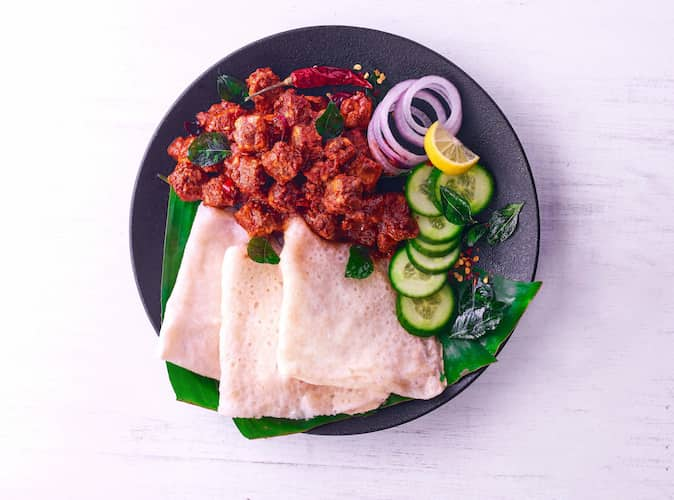Nothing personal about it, but I find this whole trend of mock meats or alternative meats a bit pretentious. For those in the dark (and I’m sure that’s a minority), mock meats are meats that mimic the taste of animal meat but are processed from plant-based protein - like soyabean, tempeh, wheat, or pea protein - with the addition of fungi-like yeast, which helps create the texture, taste, appearance and, in some cases, the smell of meats. Other meat alternatives or analogues, as they are referred to within the industry, involve curing vegetable substitutes like jackfruit (which is gaining currency both for its fibrous texture, taste, and health quotient) and eggplant to be used in recipes, which can vary from a Thai Red/Green Curry to an Indian Keema Mutter Masala.
The more I see of these trends, the stronger I feel that, either be or don’t be vegetarian, but don’t be a wannabe. I mean, how should one feel reading names of dishes like pork or chicken sausages or pork pepperoni for your pizza, chicken grilled patty for your burger, Darjeeling chicken momo (down to the hill station known for its momo specifics), besides the chicken and mutton nuggets/keema, all with a rider of being plant-based? Wait, there is more… How does, for example, a Vegan Chicken Vindaloo or a Vegan Butter Chicken sound to your ears?
Those batting for sustainability, however, argue that animal agriculture or raising livestock and poultry for human consumption is creating carbon footprints of an unimaginable magnitude and can create dire consequences for planet Earth.
This concern has also given rise to a parallel industry of ‘lab-grown’ meat, which is cultured meat cultivated using animals’ cells gleaned from a body part of the animal which are then propagated in a suitable environment. The resulting product resembles the texture and consistency of the meat of an animal. While this method checks the random killing of animals for an ever-growing demand by the meat industry, this is still not the healthiest or a vegan option, which is more popular.
Coming back to mock meats, it has now pervaded not just the menus of vegan restaurants or the kitchens of vegan consumers but is also gaining popularity with the non-vegetarian and environmentally conscious population, which consider mock meats as their go-to option, for taste as well as health reasons. Besides the restaurants which vie for attention about their plant-based menus, there are home-grown startups making mock meats which look and taste like the real McCoy.
According to the Foreign Agricultural Service of the US, India’s meat substitutes market is expected to touch $47.57 million (₹315 crore) by 2026. Adding impetus to the trend are studies that have found that plant-based products, be it protein or meat substitute, were on average lower in calories and saturated fat, and higher in carbs and fibre than meat products. However, like a nutritionist friend points out, a number of additives like palm olein oil, emulsifying agents, and preservatives are added to make mock meats look and taste the way they do as well as for enhancing their shelf lives, and here is the catch. Not every plant-based protein brand goes the healthy way as far as ingredients are concerned.

Consider the classic example of soya chaap, which has invaded every street, nook and corner of not only metros but smaller towns as a substitute for not only paneer and meat, but its older boring version of soya chunks, going by the generic brand name of ‘Mealmaker’.
One of India’s foremost premium soya chaap brands whose Punjabi founders are as Gabru as its name, offers kebabs, burgers, sandwiches, momos, biryani, and wraps, all centring around its soya chaps, with a chatkaare Punjabi dhaba sensibility. Kaake Di Tandoori Chaap, Oye Hoye Achaari Chaap, YoYo Singh Chaap Burger, Kinni Sohni Masala Chaap, Patiala Peg Chaap Sandwich, and hold your breath, a Pardesi Chaap Lasagna, are amongst the varied offerings.
 Tempayy Ghee Roast
Tempayy Ghee Roast
The advantages fungi have over conventional plant-based proteins are its fibrous texture enabling a wider variety of types and cuts of meat, a neutral flavour, eliminating the need for masking agents. It requires only a small amount of land, energy and water to produce, and it packs a nutritional punch that matches meat and rival plants.
However, like sustainable farming and organic café owner Kavitha Mantha argues, it is going to be a lost cause if mock meats take over the vegan rhetoric as at the end of the day, mock meats are made in a lab. Natural, ethical, local, fresh and sustainable ways of raising meat and finding a balance to the burgeoning demands of the meat industry is a better option.
I would definitely agree to the above, though, like they say, it’s easier said than done. But it would be advisable to use soya chaap in moderation and use a check and balance option on the trend of mock meats like soya chaap being considered the healthier mock meat option, as the jury is still out on whether the mock meat industry is going to help save the planet.


